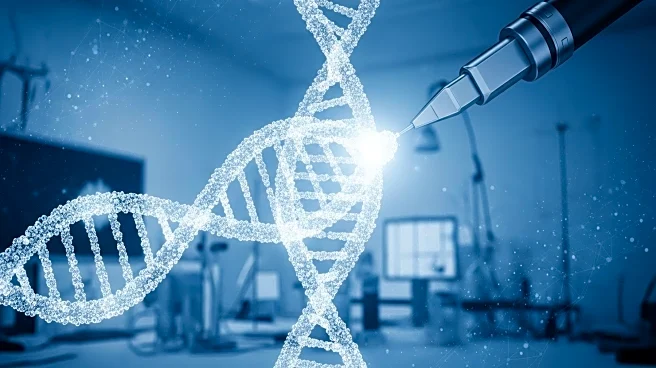What's Happening?
MIT researchers have developed a refined method to improve the precision of prime editing, a gene-editing technique that could transform the treatment of genetic diseases. Prime editing, introduced by scientists at the Broad Institute of MIT and Harvard, is a more precise version of CRISPR technology, which uses the Cas9 enzyme to cut DNA at specific locations. The new approach reduces errors in prime editing by altering key proteins involved in the process, significantly lowering the rate of unintended mutations. This advancement could make gene therapy safer and more practical for treating a wide range of diseases. The study, led by Koch Institute research scientist Vikash Chauhan, was published in Nature and funded by several research foundations.
Why It's Important?
The development of a more precise gene-editing tool is crucial for advancing gene therapy, which aims to correct genetic mutations responsible for various diseases. By reducing the error rate in prime editing, MIT's research enhances the safety and efficacy of gene therapy, potentially benefiting patients with genetic disorders. This improvement could lead to more widespread adoption of gene-editing technologies in clinical settings, offering new treatment options for conditions previously considered untreatable. The ability to edit genes with fewer side effects is a significant step forward in personalized medicine, where treatments are tailored to individual genetic profiles.
What's Next?
MIT researchers are working on further improving the efficiency of prime editors and exploring ways to deliver these tools to specific tissues in the body, a longstanding challenge in gene therapy. They hope other research labs will integrate the new prime editing approach into their studies, potentially accelerating the development of treatments for various genetic diseases. The team is also focused on expanding the application of prime editing in research settings, where it can be used to study tissue development, cancer cell evolution, and cellular responses to drug treatments.
Beyond the Headlines
The ethical implications of gene editing continue to be a topic of debate, particularly concerning the potential for unintended consequences and the long-term effects of genetic modifications. As prime editing becomes more precise, discussions around the responsible use of gene-editing technologies are likely to intensify, highlighting the need for robust regulatory frameworks to ensure safety and ethical standards are maintained.









